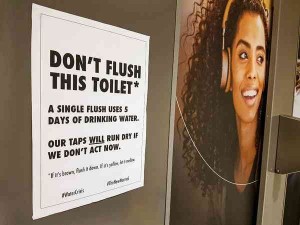This blog was written by Marilyn Hall who is lucky enough to travel the world with friends.
Last month I traveled to Cape Town, South Africa in search of water conservation ideas……Here are some things I learned.
Cape Town is really far away. We drove an hour to the Atlanta airport, flew 9 hours to Amsterdam, had a two-hour layover, and then flew 11 hours to Cape Town. When we arrived all I wanted to do was splash some water on my face, wash my hands, and brush my teeth. Much to my disappointment, there was no running water at the sinks at the airport!
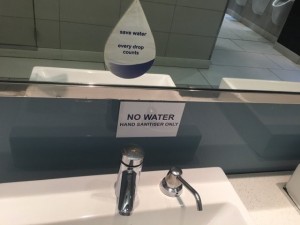
Splashing hand sanitizer on your face is not very refreshing.
Cape Town is experiencing an epic drought. Drought reminders were everywhere, so I decided to take photos to share with the Athens-Clarke County Water Conservation Office. Hands sticky from hand sanitizer, I proceeded to customs and immigration. These are some of the things I saw.
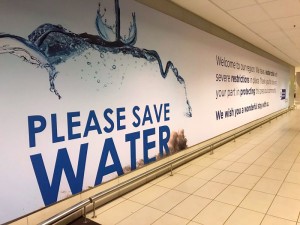
Signs the size of billboards lined the walls at the airport.
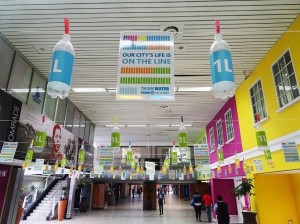
Their water use is “on the line”. Clever outreach idea.
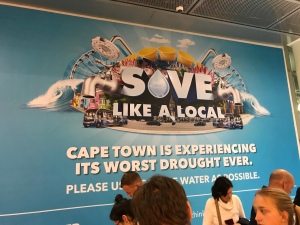
Save like a local? What does that mean? I was about to find out.
Four million people call Cape Town home and they are three years into the region’s worst drought on record. The reservoirs supplying South Africa’s second most populated city are almost empty. Residents are limited to 50 liters per day, only 13.2 gallons. The average American family uses more than 300 gallons every day, and that is just at home!
I also saw several signs promoting investment in Cape Town. The economic impact of a drought like this must be enormous. Imagine seeing signs claiming that Cape Town is running out of water next to signs promoting investment there.

Due to phone battery problems (thanks, Apple), I don’t have any photos of the investment signs at the airport. But they looked something like this.
What could the impacts be? I asked my travel companions and they were concerned about public health, civil unrest, and social equity. One asked what the city would do if there was a fire. I added that there are economic impacts such as lower rates of investment and job losses.
Day zero is the date when officials believe that Cape Town will run out of water. By the end of my trip, the number of days to Day Zero had increased to 136. The fact that I was there probably had little to do with the improvement, but you never know.
Assuming it rains during their rainy season, political leaders believe that Day Zero will not happen in 2018... But what if it doesn’t rain?
Years ago water resources planners knew this was coming. I spoke with a lot of people while I was there. I asked my Uber drivers, restaurant staff, people working at the hotels, etc. They all told the same story. It went something like, “The government knew that they were going to run out of water, and ‘they’ were going to fix it.” Years ago, if they had implemented recommended strategies such as augmenting water supplies with recycled water, they would not be in the position they are now.
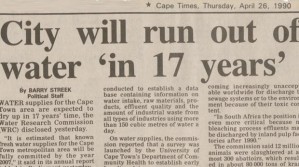
Although water planners knew drought would be a problem, political leaders chose not to invest in infrastructure.
I am not sure what the people in Cape Town are going to do if Day Zero arrives. One Uber driver told me has never had reliable drinking water and he will survive Day Zero. I admire his resilience, but I am worried for the 4 million residents of Cape Town.
It is nice to be back home in Athens where we have conscientious local leaders who are willing to take responsibility for the future. In February 2107, Athens’ Mayor and Commission approved the three recommendations of a risk-based water assessment. First, implement a water reuse program to send recycled water to industrial users that will offset demands for potable drinking water. Second, develop additional conservation measures to reduce per capita demands by an additional 10%. Third, investigate the feasibility of additional raw water and recycled water storage. These solutions will ensure that Athens will have reliable water supplies in the future.
I would love to travel to Cape Town again. Hopefully, they will have resolved their water crisis before my next visit.
—
How much water is left in Cape Town today? Check out their water dashboard.
To learn more about the water crisis in Cape Town check out this great website from the University of Cape Town.

